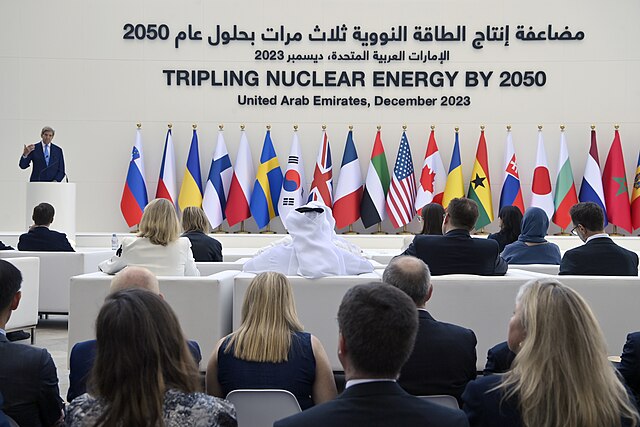
The news came out last week that despite being the hosts of the COP28 summit, the United Arab Emirates is ramping up its oil production. The major focus of the talks during this summit is the phasing down or complete abolishment of fossil fuels including oil and gas so the news of more oil production subverts the goals of the summit.
UAE’s state oil firm, Adnoc, which is in the process of rapid expansion, may drill 42% more oil by the year 2030 and between 2023 and 2050, only Saudi Arabia is predicted to produce more.
The firm have responded to criticism stating that it was inevitable that more oil and gas would be needed and that they were planning on making their activities more climate-friendly, attempting to break into the world of renewable energy.
Bill Hare, a senior scientist with Climate Analytics, the growth in Adnoc’s production rate is “staggering” and “is completely against everything we know that needs to be done to limit warming to 1.5C.” This 1.5C goal appears frequently in global climate talks but according to the analysis by Rystad Energy, emissions from Adnoc’s increased production by 2050 would be over 14 billion tonnes of CO2 and that is 6% of the Earth’s entire budget to keep global warming under 1.5C.
This contradictory news has caused controversy and many are arguing that to increase oil production yet still claim to be following the guidelines of the Paris agreement is an oxymoron and isn’t possible to achieve. For example, Fatih Birol, the head of the International Agency Energy, said that this expansion is not compatible.
An Adnoc spokesperson has countered these claims, suggesting that the analytics merely display production capacity rather than what is actually predicted to be produced. However Global Witness say they analysed “projected annualised hydrocarbon extraction rates” which would suggest actual production. This therefore counters that claim and has put pressure on Sultan al-Jaber, as COP President and fossil CEO, to lead by example and come forward with a pledge to not go forward with the production levels that Adnoc are predicted to reach. Bas Eickhout, a member of the Green Party in the European Parliament, has said that “Not only his own credibility is at stake, but it will also determine the success or failure of UAE’s COP Presidency.”
Al-Jaber has laid out four key goals comprising fast-tracking a fair, orderly and achievable energy transition and these are: fixing climate finance, putting nature, lives and livelihoods at the forefront of climate action and mobilising for the most inclusive COP so far.
At the opening plenary of the COP28 summit, a loss and damage fund was agreed- something that has been demanded for decades. This fund refers to the destruction that the climate crisis is already having on people and infrastructure meaning that vulnerable countries that have had little to do with causing the climate crisis can hold the biggest fossil fuel producing countries liable for the negative effects they are now trying to combat.
Despite this good news for vulnerable countries, the money pledged for this fund totals 700 million dollars (£557m) but this covers less than 0.2% of what is needed every year. Annual costs are estimated at 100 billion to 580 billion dollars.
Also, many large countries and those which damage the environment with their carbon emissions more than others, are reluctant to accept liability for the past. This agreement also highlights the gap that is growing between the financial needs of developing countries and the money that is provided to cut emissions.
It was agreed between the attending countries that there is a need to “transition away from fossil fuels in energy systems”
At the closing of the COP28 summit, it was agreed between the attending countries that there is a need to “transition away from fossil fuels in energy systems”. However, this deal does not have a timeframe and also doesn’t enforce the rule, only encourages its following. As much as this is positive news for the climate, many groups such as the US, UK, EU and countries extremely vulnerable to climate change, had wanted to be hit with the iron fist in regards to this rule. More obligation to adhere was the general consensus amongst these groups.
This agreement now also includes the global targets to triple the capacity of renewable energy such as wind and solar power and to double the efficiency of these sources of energy. The goal for this is 2030.
The COP28 summit may be a beacon of light in decreasing the gap between the developed and developing countries in regards to carbon emissions but critics of COP, such as Greta Thunberg have labelled these summits as “greenwashing” which refers to letting countries promote their climate goals without actually providing evidence that they have made the changes.
So far, the world is not acting fast enough to meet the goals of the Paris agreement formed in 2015 but the success of this summit in Dubai will be determined by the choices and the changes that the world practises in the years to come.


